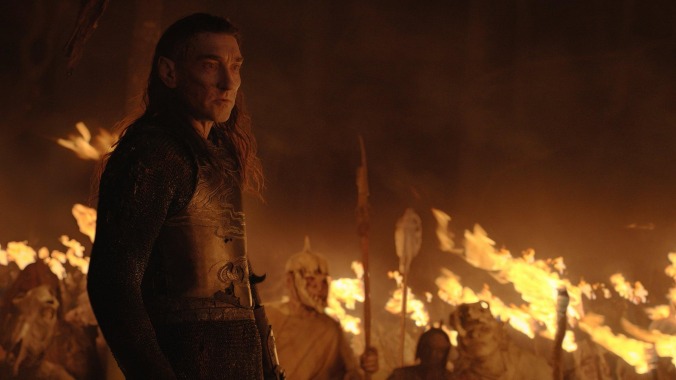An ode to The Rings Of Power's strongest element, Joseph Mawle’s Adar
Following Prime Video's shocking decision to recast Adar, it's time for an appreciation of the Orc savior who salvaged the $500 million series

The first season of Amazon’s The Lord Of The Rings: The Rings Of Power arrived on a great wave of controversy and debate. That’s nothing new for J.R.R. Tolkien, who consistently reworked, revised, and added to his legendarium throughout his life. However, the holes in Middle-earth’s history that co-creators J.D. Payne and Patrick McKay used to stage its narrative confounded fans, and their depiction of an angry, war-hungry Galadriel angered others. But almost everyone agreed on one thing: Joseph Mawle’s performance as the Orc leader Adar was something special.
A good villain can turn the dial on any story, but Mawle’s Adar seemingly unlocked the whole series, revealing the complexity and nuance beneath the franchise’s spectacle. From his first appearance in episode three, “Adar,” Mawle brought true menace and mystery to the series, driving audiences toward the season’s surprise climax: The eruption of Mount Doom. Unfortunately, Joseph Mawle won’t see his Orc children free. The role was recast with Sam Hazeldine from Peaky Blinders, and what a shame it is.
While a recasting isn’t always disastrous, fans are mourning Mawle’s departure with good reason. His Adar came fully formed as if we knew his character’s history the second he walked on screen. As sensitive as he was sinister, Mawle’s Adar was the key to the most exciting and necessary reckoning on the show, challenging the assumption that Orcs are inherently evil. If Galadriel’s (Morfydd Clark) opening lines this season, “Nothing is born evil,” are true, then Adar complicates her belief in the thesis.
Adar arrived in a cloud of mystery, capturing and interrogating Arondir (Ismael Cruz Córdova) in the trenches of the Southlands. The Uruk presented a different type of character for the show. Even more than Galadriel, Adar has been on the case for a long time. Among the Elves taken by Morgoth in the First Age, Adar was one of the Dark Lord’s earliest genetic experiments. But unlike the Elves, who barely notice the passage of time, Mawle presents a weariness. Unfazed by Galadriel’s plans, he simply lets the work proceed.
Mawle gives us a taste of his power and pain throughout the season. A scene in episode five, “Partings,” offers a poetic and disturbing explanation of the Orcs’ relationship with the sun, offering audiences a new twist for Middle-earth: Sympathy for the Orcs. As Mawle stands in the beams of light cutting through the forest, he instructs a nearby Orc shrouded in rags to hold out his arm and allow the sun’s rays to scorch the Orc’s skin. “I wish you could feel it like I do,” Adar says of the sun. “Soon, it will be gone, the part of me that knew its warmth as well.” Mawle’s combination of gentleness and simmering rage gives the audience a reason to empathize with the minions that, until now, have represented evil incarnate.
Mawle’s most remarkable scene was also the season’s high point. In the thrilling final third of episode six, “Udún,” Galadriel captures Adar, believing him to be a prime suspect in her season-long investigation into Sauron’s identity. But his performance goes one better, casting any simplified notions that Orcs are evil and Elves are good into the fire. Adar challenges the audience’s understanding of the battle lines, confronting Galadriel with the truth: He’s not the only Elf to touch the darkness.
His patience in the scene, his silence, ratchets up the tension. Unconcerned with Galadriel, Adar bides his time until his plan can commence. When Galadriel calls him a “Moriondor,” or one of the first orcs, he corrects her. “Uruk,” Adar responds. “We prefer ‘Uruk.’” When Galadriel mentions Sauron, he sneers. When she suggests bringing the “prisoners into the sunlight,” he wakes up. Mawle’s explanation of Sauron’s intentions to “heal the world” and to craft something “not of the flesh but over flesh” shows the actor’s gifts.
The subdued performance evokes an ancient pain and a historical depth that fuels the magic of Tolkien’s creation. And Adar cannot be separated by his history. He wears it on his face, it lingers on his trembling voice, and it drips from his every movement. Mawle did something all the prophecies struggled to do; he made the power of the unseen world tangible and dangerous simply by discussing it with conviction.
Joseph Mawle delivered a performance with a gravitational pull. For all the mysteries and twists in Rings Of Power, none matched his steady rise to power. His nuanced and sensitive interpretation of the oldest living Orc set a high bar for the rest of the series, and Amazon will have to conjure the power of the unseen world to get us to forget it anytime soon.